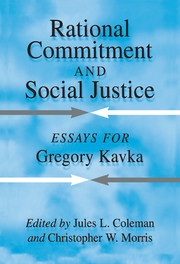Book contents
- Frontmatter
- Contents
- Acknowledgments
- List of Contributors
- Introduction: The Moral and Political Philosophy of Gregory Kavka
- Some Personal Memories
- The Shadow of the Future
- A New Paradox of Deterrence
- Rethinking the Toxin Puzzle
- Toxin, Temptation, and the Stability of Intention
- The Toxin Puzzle
- Religion and Morality in Hobbes
- Contemporary Uses of Hobbes's Political Philosophy
- The Knavish Humean
- Some Considerations in Favor of Contractualism
- Justice, Reasons, and Moral Standing
- Wrongful Life: Paradoxes in the Morality of Causing People to Exist
- Gregory S. Kavka's Writings
The Knavish Humean
Published online by Cambridge University Press: 28 October 2009
- Frontmatter
- Contents
- Acknowledgments
- List of Contributors
- Introduction: The Moral and Political Philosophy of Gregory Kavka
- Some Personal Memories
- The Shadow of the Future
- A New Paradox of Deterrence
- Rethinking the Toxin Puzzle
- Toxin, Temptation, and the Stability of Intention
- The Toxin Puzzle
- Religion and Morality in Hobbes
- Contemporary Uses of Hobbes's Political Philosophy
- The Knavish Humean
- Some Considerations in Favor of Contractualism
- Justice, Reasons, and Moral Standing
- Wrongful Life: Paradoxes in the Morality of Causing People to Exist
- Gregory S. Kavka's Writings
Summary
The title of this essay is not meant to impugn Humeans; it is only meant to recognize a kind of person that some Humeans might have thought impossible, namely, someone with a full complement of other-regarding sentiments who possesses those “useful” natural virtues (such as benevolence) of the sort described by Hume but who nonetheless behaves like a “knave” (to use Hume's own word) in situations where he can exploit another with impunity. In the Second Inquiry, Hume regards such knavishness as resulting from of a lack of concern for, and integrity with respect to the treatment of, one's fellow human beings. Hume represents the knave's point of view as follows:
And though it is allowed that, without a regard to property, no society could subsist; yet according to the imperfect way in which human affairs are conducted, a sensible knave, in particular incidents, may think that an act of iniquity or infidelity will make a considerable addition to his fortune, without causing any considerable breach in the social union or confederacy. That honesty is the best policy, may be a good general rule, but is liable to many exceptions; and he, it may perhaps be thought, conducts himself with most wisdom, who observes the general rule, and takes advantage of all the exceptions. (Enq, ix, ii, pp. 282–3)
- Type
- Chapter
- Information
- Rational Commitment and Social JusticeEssays for Gregory Kavka, pp. 150 - 167Publisher: Cambridge University PressPrint publication year: 1998
- 1
- Cited by



